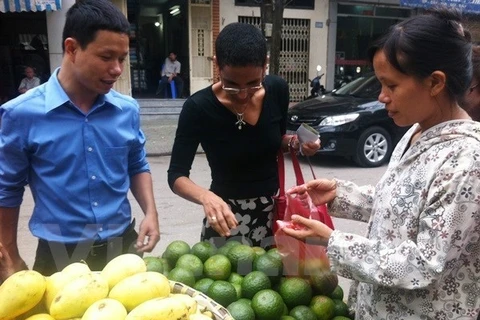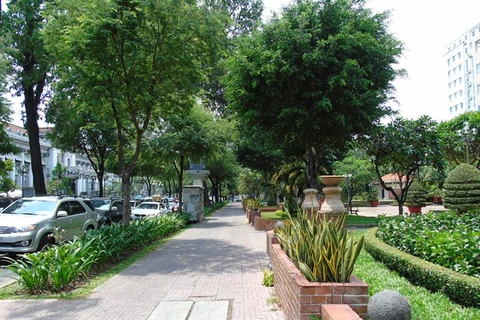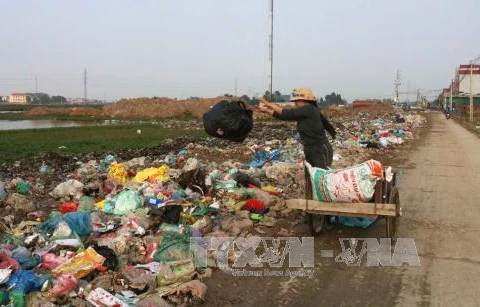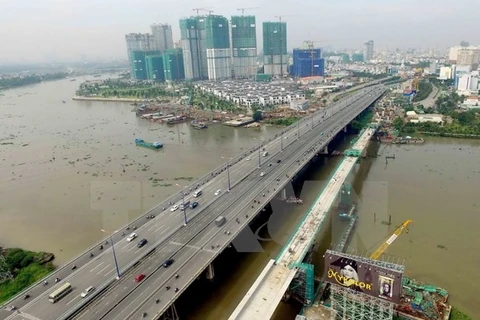HCM City (VNA) - Authorities in the southern economic hub of Ho Chi Minh City have issued an ultimatum, ordering all its districts to submit plans to the People’s Committee on getting rid of unplanned markets by July.
Unplanned markets, which are areas with a concentration of street vendors selling agricultural produces and other common items, usually crop up on pavements based on people’s needs and conveniences that are not met by modern supermarkets and stores, not part of city’s planning.
However, products sold in such spots are more often than not of questionable origin and food safety is a big issue. Authorities frequently crack down on such markets, both for food safety and during urban order restoration campaigns.
Many experts are sceptical about the effectiveness of these campaigns, and argue that if forceful measures are not taken to address the root cause of the issue, then the street markets will return after the campaigns end.
There is no official figure on the number of street markets in HCM City, but the number may be well in hundreds as these markets are ubiquitous in every district and ward, cropping up most often in and around poor neighbourhoods, areas with a large number of boarding houses, near processing zones and industrial parks.
For instance, in the two-km radius around Tan Binh industrial park, there are dozens of such unplanned markets lining the pavements of Pham Van Bach, Che Lan Vien-Nguyen Huu Tien, Truong Chinh and other streets, and they have been around for years now.
Vendors set up stalls and sell products such as fish and vegetables over the pavements, and there is rubbish, decaying leaves, and wastewater right underneath, making the area an eyesore and posing serious hygiene risks.
Most vendors are workers or poor labourers from other provinces who have come to the city to try and earn their livelihood.
Nguyen Thi Thuc, a textile worker from Tan Bình industrial park who hails from the central Thanh Hoa province, told Lao Dong (Labour) newspaper that she lives in a rented place nearby and after work, she goes to these street markets to buy food. “I know there is no guarantee for the safety of food sold here, but it is affordable, and, most of all, the markets are convenient. I just thoroughly wash the produce and cook it very well,” Thuc said.
The situation is similar around Linh Trung processing zone in Thu Duc district, or Tan Thuan in district 7 and Tan Tao industrial park in Binh Tan district.
A member of Tan Binh industrial park’s management board said that unplanned, temporary street markets always come up around industrial parks and areas with boarding houses.
It shows that they meet the demands of the workers who live in these areas, so the solution to the problem is a more consumer-responsive distribution network.
Nguyen Gia Thai Binh, vice-chairman of Binh Tan district People’s Committee, said one of the characteristics of his district is the high concentration of industrial zones, with companies such as the Taiwan-based Pouyuen footwear company, which alone employs some 97,000 workers. “The planning did not account for the workers’ needs for a proper market, so people started selling agricultural produce and other products on the streets near large manufacturers for the workers there, and slowly street markets were formed,” Binh said.
He admitted that the efficiency of inspections and raids is limited, as once the enforcement force leaves, vendors return and resume their trade.
To get rid of these street markets, Tran Vinh Tuyen, Vice Chairman of the HCM City People’s Committee, has asked the municipal Department of Industry and Commerce to set up proper stalls and stores that sell food, consumer goods, and other price-stabilised commodities in crowded neighbourhoods and industrial zones.
Now, Binh Tan district is drawing up a detailed plan for indoor markets and convenience stores. So far, 100 convenience stores have been established, mostly serving workers in industrial parks.
Similarly, Tan Binh district is looking at steps to encourage its street vendors to move to stalls and stores, and plans to offer financial support to those who come from very poor backgrounds, said Le Thanh Binh, Vice Chairman of Tan Binh district People’s Committee.
“If the whole political system does its best, coordinating efficiently with each other in this campaign to clear out street markets in addition to establishing consumer commodities distributors, then I believe the days of street markets will be over,” said Tran Quoc Minh, a member of HCM City’s lawyer delegation.-VNA
Unplanned markets, which are areas with a concentration of street vendors selling agricultural produces and other common items, usually crop up on pavements based on people’s needs and conveniences that are not met by modern supermarkets and stores, not part of city’s planning.
However, products sold in such spots are more often than not of questionable origin and food safety is a big issue. Authorities frequently crack down on such markets, both for food safety and during urban order restoration campaigns.
Many experts are sceptical about the effectiveness of these campaigns, and argue that if forceful measures are not taken to address the root cause of the issue, then the street markets will return after the campaigns end.
There is no official figure on the number of street markets in HCM City, but the number may be well in hundreds as these markets are ubiquitous in every district and ward, cropping up most often in and around poor neighbourhoods, areas with a large number of boarding houses, near processing zones and industrial parks.
For instance, in the two-km radius around Tan Binh industrial park, there are dozens of such unplanned markets lining the pavements of Pham Van Bach, Che Lan Vien-Nguyen Huu Tien, Truong Chinh and other streets, and they have been around for years now.
Vendors set up stalls and sell products such as fish and vegetables over the pavements, and there is rubbish, decaying leaves, and wastewater right underneath, making the area an eyesore and posing serious hygiene risks.
Most vendors are workers or poor labourers from other provinces who have come to the city to try and earn their livelihood.
Nguyen Thi Thuc, a textile worker from Tan Bình industrial park who hails from the central Thanh Hoa province, told Lao Dong (Labour) newspaper that she lives in a rented place nearby and after work, she goes to these street markets to buy food. “I know there is no guarantee for the safety of food sold here, but it is affordable, and, most of all, the markets are convenient. I just thoroughly wash the produce and cook it very well,” Thuc said.
The situation is similar around Linh Trung processing zone in Thu Duc district, or Tan Thuan in district 7 and Tan Tao industrial park in Binh Tan district.
A member of Tan Binh industrial park’s management board said that unplanned, temporary street markets always come up around industrial parks and areas with boarding houses.
It shows that they meet the demands of the workers who live in these areas, so the solution to the problem is a more consumer-responsive distribution network.
Nguyen Gia Thai Binh, vice-chairman of Binh Tan district People’s Committee, said one of the characteristics of his district is the high concentration of industrial zones, with companies such as the Taiwan-based Pouyuen footwear company, which alone employs some 97,000 workers. “The planning did not account for the workers’ needs for a proper market, so people started selling agricultural produce and other products on the streets near large manufacturers for the workers there, and slowly street markets were formed,” Binh said.
He admitted that the efficiency of inspections and raids is limited, as once the enforcement force leaves, vendors return and resume their trade.
To get rid of these street markets, Tran Vinh Tuyen, Vice Chairman of the HCM City People’s Committee, has asked the municipal Department of Industry and Commerce to set up proper stalls and stores that sell food, consumer goods, and other price-stabilised commodities in crowded neighbourhoods and industrial zones.
Now, Binh Tan district is drawing up a detailed plan for indoor markets and convenience stores. So far, 100 convenience stores have been established, mostly serving workers in industrial parks.
Similarly, Tan Binh district is looking at steps to encourage its street vendors to move to stalls and stores, and plans to offer financial support to those who come from very poor backgrounds, said Le Thanh Binh, Vice Chairman of Tan Binh district People’s Committee.
“If the whole political system does its best, coordinating efficiently with each other in this campaign to clear out street markets in addition to establishing consumer commodities distributors, then I believe the days of street markets will be over,” said Tran Quoc Minh, a member of HCM City’s lawyer delegation.-VNA
VNA
























